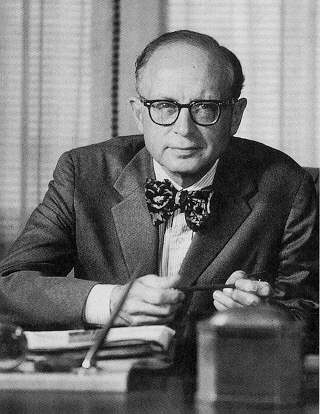Daniel J. Boorstin Round-Up
I mentioned Daniel J. Boorstin the other day, and wanted to post some links about him and his work. Boorstin, who passed away last year, taught at the University of Chicago for 25 years, was Librarian of Congress for 12 years, and was one of the greatest American historians of the second half of the 20th Century.

The Main Man.
He's best known (IMHO) for three works:1) The Image: A Guide to Pseudo-Events in America, which is probably his best-known single book. Though written in 1962, it foresaw events such as the Manchester, NH Bisquick Pancake Flipping Contest in which potential leaders of the Free World are invited to display their breakfast-preparation skills. Chapter One (or at least most of it, anyway) can be read here. This is the book that made famous the quote "A celebrity is a person who is well-known for their well-knownness" and which opens with this clever exchange:
ADMIRING FRIEND: "My, that's a beautiful baby you have there"
MOTHER: "Oh, that's nothin--you should see his photograph!"
Even though Boorstin was talking about the early days of television and things like the Kennedy-Nixon Debate, his ideas here have proven quite prescient and continue to stand the test of time. (Note: For a more recent examination of the Kennedy-Nixon Debate and other aspects of the JFK/RMN relationship, see this excellent book by Chris Matthews.)
2. The Americans: The Colonial Experience, The National Experience, and The Democratic Experience. This is a great trilogy. Here's what the NYT had to say in 1958 about "Colonial": He makes no attempt to tell the full stories of the colonies. Instead, he discusses a variety of topics that are grouped under four main headings: The vision and the reality, viewpoints and institutions, language and the printed word, and finally warfare and diplomacy. In all three, he captures all sorts of details about agriculture, business, education, freedoms, opinions, and so on as they were manifested in the era and fits them into a larger framework, as opposed to saying "first this happened, then this happened, then this, then this..." ad infinitum. BTW, here's a great collection of New York Times book reviews and articles connected to Boorstin and his writings.
3. The Discoverers, The Creators, The Seekers. This trilogy addresses topics in world history, and each examines a major theme (kind of) chronologically.
The Discoverers: A History of Man's Search to Know His World and Himself deals with people in history who wanted to know what and how -- scientists, philosophers, economists, explorers, inventors -- people (some well-known, some almost forgotten) who spent their lives devising models and schemata with which to understand the phenomena around them, or who tested the hypotheses of others, or who organized the discoveries of others into coherent frameworks. Figures written about here include Galileo, Columbus, and Darwin (what world history book wouldn't?), but also such fascinating but less-known characters as Sir Anthony Panizzi, Heinrich Schliemann, and Marcello Malpighi. They made an IMAX movie based on this book.
The Creators: A History of Heroes of the Imagination was the next in the series and studies (as you might guess) creative people -- artists, writers, musicians, and so on. Figures studied range from Homer and Dante to Dr. Johnson, Proust, and Wagner.
The Seekers: The Story of Man's Continuing Quest to Understand His World is the slimmest of the three (my version is 259 pages of text) and deals with people who asked the big "Why?" questions -- some philosophical, some religious, some humanistic, some a mixture. It looks at the lives, works, and ideas of people such as Job, Socrates, St. Benedict, John Locke, the Marquis de Condorcet, Oswald Spengler, and William James.
Boorstin wrote a number of other stand-alone books, most of which I have not (yet) read. I'm pretty sure that his first was One of his first was 1948's The Lost World of Thomas Jefferson, which I have an unread copy of, and his last was the above-mentioned The Seekers, 50 years later. If you are even a casual armchair historian and have not yet tried Boorstin, you are cheating yourself.










0 Comments:
Post a Comment
<< Home